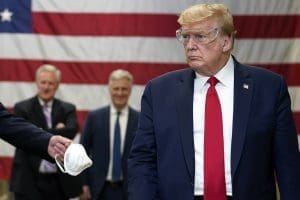Trump refuses to wear mask at mask factory — where they are required
The Honeywell plant in Arizona specifically said masks were required.

Donald Trump and his entourage of aides blatantly refused to comply with the rules at a mask factory they visited on Tuesday.
Trump traveled to Arizona to visit a Honeywell plant that is making personal protective equipment for health care workers across the country. Signs within the plant said visitors were required to wear masks “at all times,” and “observe social distancing of 6 feet at all times.”
But neither Trump nor the large entourage of aides who were with him — including chief of staff Mark Meadows and press secretary Kayleigh McEnany — wore masks. Nor did they adhere to the 6 feet social distancing rule as they huddled closely together during a tour of the factory, according to photos and video footage of the visit.
Trump not wearing mask but goggles at Honeywell facility. Other aides not wearing masks at all. Sign in facility says “face mask required in this area.” pic.twitter.com/Uq7Fr2ioeS
— Jim Acosta (@Acosta) May 5, 2020
Trump’s refusal to comply with the rules came after he told reporters ahead of his trip that he would wear a mask if required.
“If it’s a mask environment, I would certainly do that,” Trump said before he boarded Air Force One to head to Arizona for the tour. “I’ll know when I get there. But I would wear it. If it’s a mask environment, I would have no problem.”
Not only did the Honeywell plant Trump visited require masks, but Trump’s own administration has issued guidelines saying that masks should be worn “in public settings where other social distancing measures are difficult to maintain.”
Workers at the plant wore masks, according to reporters who traveled with Trump.
But members of the Trump administration did not adhere to their own guidelines or those of the plant.
That includes Mike Pence, who eventually admitted it was a mistake that he did not wear a mask during a visit to the Mayo Clinic in Minnesota, even though the medical facility required masks.
GOP lawmakers who made the trip with Trump to Arizona also didn’t wear masks ahead of the visit — which Trump reportedly treated like a campaign rally, even though it was an official White House event paid for by taxpayers. Nor did the lawmakers adhere to the social distancing guidelines to maintain a safe distance from others.
Sen. Martha McSally (R-AZ) and Arizona GOP Reps. Debbie Lesko and Paul Gosar posed for a photo before boarding Air Force One to travel to Arizona with Trump in which they huddled close together and were not wearing masks.
Headed to Arizona on Air Force One soon with @realDonaldTrump! @RepDLesko @RepGosar pic.twitter.com/xMj1am9h2q
— Martha McSally (@MarthaMcSally) May 5, 2020
It’s unclear why Lesko and Gosar were in Washington, D.C., as the House is not currently in session.
Lesko had also been in Arizona as recently as this weekend, according to her social media, which posted videos of her receiving a COVID-19 antibody test and attending a parade for a veteran in her state.
Her office did not return a request for comment about whether she traveled to Washington, D.C., specifically to fly back to her home state aboard Air Force One with Trump.
Published with permission of The American Independent Foundation.
Recommended

Biden campaign launches new ad focused on Affordable Care Act
Former President Trump has said he wants to do away with the popular health care law.
By Kim Lyons, Pennsylvania Capital-Star - May 08, 2024
Ohio doctors fear effects of emergency abortion care case set to go before U.S. Supreme Court
A federal law that allows emergency departments to treat patients without regard to their ability to pay will be under U.S. Supreme Court scrutiny this week, and Ohio doctors are concerned about the case’s local impact on emergency abortion care.
By Susan Tebben, Ohio Capital Journal - April 23, 2024
House GOP votes to end flu, whooping cough vaccine rules for foster and adoptive families
A bill to eliminate flu and whooping cough vaccine requirements for adoptive and foster families caring for babies and medically fragile kids is heading to the governor’s desk.
By Anita Wadhwani, Tennessee Lookout - March 26, 2024









































































